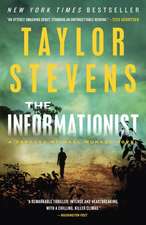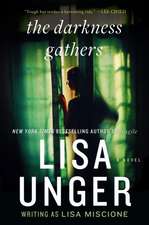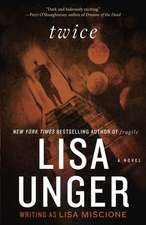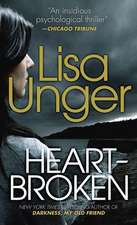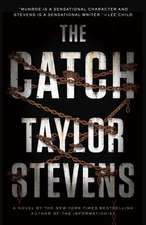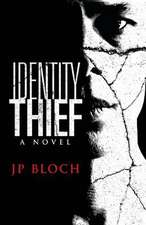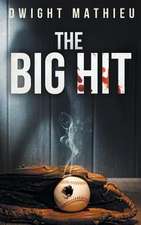Smoke: Lydia Strong Novels, cartea 04
Autor Lisa Unger, Lisa Miscioneen Limba Engleză Paperback – 30 apr 2012
In the final installment of her Lydia Strong series, bestselling author Lisa Unger, writing as Lisa Miscione, brings us her most shocking and emotionally wrenching case yet. An NYPD detective visits Lydia and her husband, P.I. Jeffrey Mark, to inform them that Lily, one of Lydia’s former writing students, has been missing for more than two weeks. Before she disappeared, Lily had tried to get in touch with Lydia, seeking her help. Could this have had something to do with the death of Lily’s brother, which Lily refused to accept as a suicide? If they want to discover the truth, Lydia and Jeffrey will have to follow the trail that Lily left behind, a trail of evidence that—like Lily herself—seems to disappear like smoke.
Preț: 109.13 lei
Nou
Puncte Express: 164
Preț estimativ în valută:
20.88€ • 21.76$ • 17.29£
20.88€ • 21.76$ • 17.29£
Carte disponibilă
Livrare economică 13-27 martie
Preluare comenzi: 021 569.72.76
Specificații
ISBN-13: 9780307953155
ISBN-10: 0307953157
Pagini: 370
Dimensiuni: 131 x 203 x 21 mm
Greutate: 0.29 kg
Editura: BROADWAY BOOKS
Seria Lydia Strong Novels
ISBN-10: 0307953157
Pagini: 370
Dimensiuni: 131 x 203 x 21 mm
Greutate: 0.29 kg
Editura: BROADWAY BOOKS
Seria Lydia Strong Novels
Notă biografică
Lisa Unger is an award-winning New York Times and international bestselling author. Her novels have sold over 1 million copies in the U.S. and have been translated into 26 different languages.
Extras
One
Lydia Strong wanted a cigarette to celebrate the defeat of her enemy. She leaned back in her chair and looked at the manuscript that sat fat and neat on her desk beside her computer. She felt like a prizefighter who had finally, after a brutal showdown, sent her opponent to the mat. The Lost Girl had taken her nearly a year to write and every page had been a battle. It was a first for her. Words were her tools, sometimes her weapons. Either way, she’d always wielded them with ease. But this book didn’t want to be written. Every day the blank page had seemed like a taunt, a dare, a bully on the playground looking for her lunch money.
Maybe it was because in the writing of it, she had to let go of things she’d been clinging to for years. Maybe because, as painful as those things were, they were comfortable, familiar, and a part of her didn’t really want to see them exorcised. But now they were safely incarcerated in the pages of her manuscript. Soon they’d be edited and revised, edited and revised again. Then they’d be exposed to the light of the world. And, like all demons, in the sun they’d turn to piles of dust.
She laughed a little, just because of the lightness of her relief. She got up from her desk and tossed around the idea of going out for a pack of cigarettes. Maybe if Jeffrey wasn’t lying on the couch reading the Sunday Times, she’d go down to the bodega on the corner of Lafayette and Great Jones, smoke a cigarette on the street and then throw away the rest of the pack. But he’d be able to tell and then he’d give her a hard time. It wasn’t worth it.
“I’m done,” she called, walking out of her office and through the loft. But he wasn’t on the couch; he was standing at the counter that divided the kitchen from the living room, talking on the phone.
“Oops, sorry,” she said when she saw him.
He looked at her strangely when she walked in. She hadn’t heard the phone ring. She took a frosty bottle of Ketel One vodka from the freezer and poured herself a lowball, trying and failing to be quiet as she put some ice in the glass and squirted some lime juice from one of those little plastic bottles shaped cutely like a lime.
“I see,” he said, lowering his eyes to the floor beneath his feet, tapping a pen on the countertop. “No, I’d rather tell her, David, if you don’t mind.”
“Is that my grandfather?” Lydia asked, looking at him now. She could tell there was something wrong, but she sipped at the drink in her hand and pretended she couldn’t. She needed a few minutes to enjoy the completion of her manuscript before life leaked in and started demanding attention.
Jeffrey put the phone back in the cradle and didn’t look at her right away.
“Did you hear me? I’m finished. I finished The Lost Girl.”
“That’s fantastic. Congratulations,” he said softly, moving toward her and taking her into his arms.
“Want a drink?” she asked.
“Not right now,” he said. She pulled away from him after a second and then walked over to the living room. The fire they’d made earlier in the afternoon was low, just a few flames danced. Outside, a light snow tapped against the windows and their view of lower Manhattan was obscured by frost.
She sat on the couch and curled her legs up beneath her. Something in her chest was thumping. She didn’t like the look on Jeffrey’s face or the careful way he was moving toward her.
“There’s some news,” he said, sitting beside her.
“Are they all right?” she asked, bracing herself. Her maternal grandparents, David and Eleanor Strong, were the only living family members to whom she had any connection. She thought of them, both hearty, young-minded, still traveling, enjoying their lives and each other. It seemed like they would always be there. But with both of them in their early seventies, she knew she’d have to deal with their mortality at some point. But she hadn’t done that yet. And she wasn’t ready.
“Oh, yeah,” he said quickly. “Yeah, they’re both fine.”
She felt a wash of relief. “Okay,” she said, releasing a breath she’d been holding.
“Then what?” she said, sitting up, leaning into him as he sat beside her. He took her hand in his and cast his eyes down.
“Your father . . .” he said, letting the sentence trail.
The phrase sounded so strange. She never thought of herself as having a father. Most times she forgot he even existed.
“What about him?” she asked, frowning.
“He’s dead, Lydia,” he said. “I’m sorry.”
Something shifted inside of her. “Dead?” she said, like it was a word that didn’t have any meaning to her.
“I’m sorry,” he said again, releasing her hand and taking hold of her shoulder. She looked at his face, saw worry there, sadness for her.
“How?” she asked after a moment where she searched herself for feeling and came up with nothing. She wanted to feel something, but there was only a cool numbness.
“Your grandfather didn’t have the details.”
She’d met her father only once, when she was fifteen years old, on the day after her mother’s funeral. It was a lifetime ago, and she found that she remembered everything about that time like a lucid dream. Some details were vivid but a strange fog seemed to hang over the events.
She remembered the door ajar on the day she discovered her mother’s body, the blaring stereo that greeted her as she arrived home. But the terrible discovery of her mother’s body and the grim investigation that followed was a jumble of isolated events with no real timeline in her memory. She remembered the crowded funeral service and the hushed sobbing and the somber voice of the priest, the burial on a day that was too bright and sunny, too beautiful. She remembered identifying Jed McIntyre as the man who’d been following her and her mother for days. She remembered the single garnet earring missing from her mother’s jewelry box. And she remembered her father’s visit. The one and only time she’d seen him in the flesh.
She had sat alone in the living room staring out the bay window at the woods behind her house. The leaves were turning, a riot of orange, red, and gold. The day was cool and sun washed, and she remembered wishing for rain. She wanted thunder and gale-force winds, hail and lightning.
She’d heard the doorbell but paid no attention, sure it was another neighbor come to offer their condolences. She pulled herself into a tight ball and closed her eyes, dreading having to smile politely, having to say she would be all right. Then she heard her grandfather’s voice as he opened the door, then a soft murmuring, then silence. Her grandfather’s voice sounded angry, but she thought she must be mistaken. Then she saw him at the door, his face tight and ashen.
Hovering behind her grandfather, there was a stranger with her storm-cloud gray eyes. Tall and slouching, poorly dressed, he held flowers and had a hangdog look about him, an aura of shame. He shifted uncomfortably from foot to foot. He was a tall, lean man, blondish, faded looking, like a bad copy of himself. Even though she’d never met him, she knew him immediately.
“You’re my father?” she asked, getting up.
“You don’t have to see him, Lydia,” her grandfather said.
But her curiosity had been great. It was the first feeling she’d had other than grief and horror since her mother died.
“No,” she said. “It’s okay, Grandpa.”
She stood up and her father walked toward her. He held the flowers out to her. She took them, her eyes fixed on him. Struggling in her relationship with her mother, she’d thought about her missing father often. None of the fantasies she’d had about him in her life had even come close to predicting the ordinary man who stood before her. She had imagined him as a great lover, dark and handsome; a motorcycle daredevil, reckless and brave; an international spy, suave and sophisticated. What other kind of man, she concluded, could have stolen her strong, beautiful mother’s heart and then left her broken and forever sad? Surely, some great danger or some irresistible intrigue had lured him from his family. In spite of what her mother said.
“Don’t fantasize about your father, Lydia,” her mother had told her numerous times. “He was just an irresponsible man, living for get-rich-quick schemes, always looking for something more than he had.”
She had never believed her mother, until the moment he stood before her, eyes begging, hands quivering. It had felt like another death for her.
She let the flowers drop to the floor, turned her back on him, and walked back to her perch by the window. She might have forgiven him for leaving them, for breaking her mother’s heart, but she could never forgive him for being so unremarkable. She could never forgive that he had obviously left them for nothing.
“It’s time for you to go,” her grandfather had said. He’d stood like a sentry in the corner of the room. He had always been a big man, with strong, imposing shoulders and hands as big as oven mitts, a strong, angular face that looked like it should be carved in a mountain somewhere.
“You’ve made her a cold bitch, just like her mother,” her father said then. For all this size, David Strong moved on him like a cat.
Up until the day they moved from the house where Lydia’s mother had been murdered, the stain left by her father bleeding into the carpet after her grandfather had belted him remained, a faint reminder of a small man. She remembered thinking that the house was full of her parents’ blood, and the thought made her stomach turn. That was the only memory she had of her father.
“Lydia,” said Jeffrey.
“I’m okay,” she said, snapping back to the present. And she was. She was shocked and there was something churning in her stomach. But she felt strong, stable. She could hardly be grief stricken for a man she’d barely known.
“I guess I’m not sure how to feel.”
Jeffrey shook his head slowly, looked at her as if he were wondering if she would cry. He didn’t say anything.
“Is there a funeral?” she asked, leaning back on the couch.
“There was. Last week. Your grandfather only found out because an old buddy of his who still lives in Nyack saw the obit.”
Lydia’s grandparents had recently moved from Nyack to a two-bedroom apartment on the Upper West Side, partly to be closer to Lydia and partly because they were unable to sleep in a house where Jed McIntyre, the man who’d murdered their daughter, had come for them as well.
Lydia nodded, placed her drink on the coffee table, and laid her head in Jeffrey’s lap.
“I’m sorry, Lydia,” he said quietly, putting a hand on her head.
“It’s a strange feeling,” she said after a few minutes of quiet. “To lose something you never had. I don’t know how to explain it. I don’t know how to feel it.”
But she knew she didn’t have to explain herself to him. He understood her; he always did. She turned around, took his hand in hers, played absently with the thick platinum band he wore on his left hand. Inscribed on the underside of it were her name and the date of their wedding. She wore a matching band, studded randomly with tiny star-cut sapphires.
They’d been married in a simple ceremony on Hanalei Bay in Kauai nearly a year ago. She’d worn a simple white linen shift and traditional plumeria lei and stood barefoot with him on the sand at sunset. Their ceremony, officiated by an old Hawaiian priestess, had been witnessed by David and Eleanor Strong and Dax Chicago, a man who’d become their closest friend.
“I can’t believe you’d have the nerve to wear white,” Dax had whispered to her after she and Jeffrey had exchanged rings. She’d laughed out loud. In all her life, she’d never felt as light and happy as she had that day. The long and treacherous journey they’d taken to the altar had ended well and she was grateful.
“What do we need to do?” Jeffrey asked her now. “You know—to observe this?”
She closed her eyes. “I don’t know. I’ll get back to you.”
It was after ten when the phone rang. Jeff was still reading and Lydia was half asleep, her head still in his lap. She’d managed to push thoughts of her father away enough to doze but not enough to actually fall asleep; a kind of low-grade sadness and uneasiness had taken hold of her. She hopped up to get the phone.
“Who’d call so late?” asked Jeff, not looking up from his book on New York State gun law. He had his glasses on, which Lydia thought made him look sexy and intellectual. He thought they just made him look old but he couldn’t read without them so he endured.
“Must be more good news,” said Lydia. She was thinking to herself that it was probably Dax, king of trampling boundaries.
The caller ID read “unavailable.”
“Hello?”
“This is Detective Matt Stenopolis, NYPD Missing Persons Unit. I need to speak to Lydia Strong.”
His voice sounded youngish but there was a gravity and deep timbre to it that told Lydia he took himself seriously and expected others to do the same.
“This is.”
“Ms. Strong, you left a message for Lily Samuels about two weeks ago indicating that you were returning a call she made to you.” She could hear street noise on the other end of the phone.
“That’s right,” she said, concern and curiosity aroused.
He cleared his throat. “Ms. Samuels has been missing now for over two weeks and I’m wondering if we can talk.”
“Sure,” she said. “Of course.”
“I’m calling from my car. I know it’s late but would it be inconve-nient if I came by?”
“Um, no,” she said glancing at the clock. “Come on by.”
She gave him the address and hung up the phone.
“Who was that?” said Jeffrey, putting down his book and looking at her.
“A detective. Lily Samuels is missing,” she said leaning against the counter.
“Who?”
“Remember that journalism class I taught at NYU as a visiting professor a couple of years ago? She was one of my students. She started at the Post last year on the crime desk.”
Lydia had felt a special affinity for Lily from the day she had walked into the large, over-warm classroom and sat in the front row. There was an earnestness, an honesty to her that Lydia could see in her deep brown eyes. And she had a belly full of fire. Lydia could always recognize it, that love of the hunt, that drive for the heart of a story. Lily’s talent had set her apart from the rest of the class; the kindness and compassion in her interview style and in her writing put her head and shoulders above most of the professional writers Lydia knew. In the past two years, Lydia had given her advice on pursuing stories she was working on for her degree, and eventually a reference that got her a foot in the door at the Post.
Lydia Strong wanted a cigarette to celebrate the defeat of her enemy. She leaned back in her chair and looked at the manuscript that sat fat and neat on her desk beside her computer. She felt like a prizefighter who had finally, after a brutal showdown, sent her opponent to the mat. The Lost Girl had taken her nearly a year to write and every page had been a battle. It was a first for her. Words were her tools, sometimes her weapons. Either way, she’d always wielded them with ease. But this book didn’t want to be written. Every day the blank page had seemed like a taunt, a dare, a bully on the playground looking for her lunch money.
Maybe it was because in the writing of it, she had to let go of things she’d been clinging to for years. Maybe because, as painful as those things were, they were comfortable, familiar, and a part of her didn’t really want to see them exorcised. But now they were safely incarcerated in the pages of her manuscript. Soon they’d be edited and revised, edited and revised again. Then they’d be exposed to the light of the world. And, like all demons, in the sun they’d turn to piles of dust.
She laughed a little, just because of the lightness of her relief. She got up from her desk and tossed around the idea of going out for a pack of cigarettes. Maybe if Jeffrey wasn’t lying on the couch reading the Sunday Times, she’d go down to the bodega on the corner of Lafayette and Great Jones, smoke a cigarette on the street and then throw away the rest of the pack. But he’d be able to tell and then he’d give her a hard time. It wasn’t worth it.
“I’m done,” she called, walking out of her office and through the loft. But he wasn’t on the couch; he was standing at the counter that divided the kitchen from the living room, talking on the phone.
“Oops, sorry,” she said when she saw him.
He looked at her strangely when she walked in. She hadn’t heard the phone ring. She took a frosty bottle of Ketel One vodka from the freezer and poured herself a lowball, trying and failing to be quiet as she put some ice in the glass and squirted some lime juice from one of those little plastic bottles shaped cutely like a lime.
“I see,” he said, lowering his eyes to the floor beneath his feet, tapping a pen on the countertop. “No, I’d rather tell her, David, if you don’t mind.”
“Is that my grandfather?” Lydia asked, looking at him now. She could tell there was something wrong, but she sipped at the drink in her hand and pretended she couldn’t. She needed a few minutes to enjoy the completion of her manuscript before life leaked in and started demanding attention.
Jeffrey put the phone back in the cradle and didn’t look at her right away.
“Did you hear me? I’m finished. I finished The Lost Girl.”
“That’s fantastic. Congratulations,” he said softly, moving toward her and taking her into his arms.
“Want a drink?” she asked.
“Not right now,” he said. She pulled away from him after a second and then walked over to the living room. The fire they’d made earlier in the afternoon was low, just a few flames danced. Outside, a light snow tapped against the windows and their view of lower Manhattan was obscured by frost.
She sat on the couch and curled her legs up beneath her. Something in her chest was thumping. She didn’t like the look on Jeffrey’s face or the careful way he was moving toward her.
“There’s some news,” he said, sitting beside her.
“Are they all right?” she asked, bracing herself. Her maternal grandparents, David and Eleanor Strong, were the only living family members to whom she had any connection. She thought of them, both hearty, young-minded, still traveling, enjoying their lives and each other. It seemed like they would always be there. But with both of them in their early seventies, she knew she’d have to deal with their mortality at some point. But she hadn’t done that yet. And she wasn’t ready.
“Oh, yeah,” he said quickly. “Yeah, they’re both fine.”
She felt a wash of relief. “Okay,” she said, releasing a breath she’d been holding.
“Then what?” she said, sitting up, leaning into him as he sat beside her. He took her hand in his and cast his eyes down.
“Your father . . .” he said, letting the sentence trail.
The phrase sounded so strange. She never thought of herself as having a father. Most times she forgot he even existed.
“What about him?” she asked, frowning.
“He’s dead, Lydia,” he said. “I’m sorry.”
Something shifted inside of her. “Dead?” she said, like it was a word that didn’t have any meaning to her.
“I’m sorry,” he said again, releasing her hand and taking hold of her shoulder. She looked at his face, saw worry there, sadness for her.
“How?” she asked after a moment where she searched herself for feeling and came up with nothing. She wanted to feel something, but there was only a cool numbness.
“Your grandfather didn’t have the details.”
She’d met her father only once, when she was fifteen years old, on the day after her mother’s funeral. It was a lifetime ago, and she found that she remembered everything about that time like a lucid dream. Some details were vivid but a strange fog seemed to hang over the events.
She remembered the door ajar on the day she discovered her mother’s body, the blaring stereo that greeted her as she arrived home. But the terrible discovery of her mother’s body and the grim investigation that followed was a jumble of isolated events with no real timeline in her memory. She remembered the crowded funeral service and the hushed sobbing and the somber voice of the priest, the burial on a day that was too bright and sunny, too beautiful. She remembered identifying Jed McIntyre as the man who’d been following her and her mother for days. She remembered the single garnet earring missing from her mother’s jewelry box. And she remembered her father’s visit. The one and only time she’d seen him in the flesh.
She had sat alone in the living room staring out the bay window at the woods behind her house. The leaves were turning, a riot of orange, red, and gold. The day was cool and sun washed, and she remembered wishing for rain. She wanted thunder and gale-force winds, hail and lightning.
She’d heard the doorbell but paid no attention, sure it was another neighbor come to offer their condolences. She pulled herself into a tight ball and closed her eyes, dreading having to smile politely, having to say she would be all right. Then she heard her grandfather’s voice as he opened the door, then a soft murmuring, then silence. Her grandfather’s voice sounded angry, but she thought she must be mistaken. Then she saw him at the door, his face tight and ashen.
Hovering behind her grandfather, there was a stranger with her storm-cloud gray eyes. Tall and slouching, poorly dressed, he held flowers and had a hangdog look about him, an aura of shame. He shifted uncomfortably from foot to foot. He was a tall, lean man, blondish, faded looking, like a bad copy of himself. Even though she’d never met him, she knew him immediately.
“You’re my father?” she asked, getting up.
“You don’t have to see him, Lydia,” her grandfather said.
But her curiosity had been great. It was the first feeling she’d had other than grief and horror since her mother died.
“No,” she said. “It’s okay, Grandpa.”
She stood up and her father walked toward her. He held the flowers out to her. She took them, her eyes fixed on him. Struggling in her relationship with her mother, she’d thought about her missing father often. None of the fantasies she’d had about him in her life had even come close to predicting the ordinary man who stood before her. She had imagined him as a great lover, dark and handsome; a motorcycle daredevil, reckless and brave; an international spy, suave and sophisticated. What other kind of man, she concluded, could have stolen her strong, beautiful mother’s heart and then left her broken and forever sad? Surely, some great danger or some irresistible intrigue had lured him from his family. In spite of what her mother said.
“Don’t fantasize about your father, Lydia,” her mother had told her numerous times. “He was just an irresponsible man, living for get-rich-quick schemes, always looking for something more than he had.”
She had never believed her mother, until the moment he stood before her, eyes begging, hands quivering. It had felt like another death for her.
She let the flowers drop to the floor, turned her back on him, and walked back to her perch by the window. She might have forgiven him for leaving them, for breaking her mother’s heart, but she could never forgive him for being so unremarkable. She could never forgive that he had obviously left them for nothing.
“It’s time for you to go,” her grandfather had said. He’d stood like a sentry in the corner of the room. He had always been a big man, with strong, imposing shoulders and hands as big as oven mitts, a strong, angular face that looked like it should be carved in a mountain somewhere.
“You’ve made her a cold bitch, just like her mother,” her father said then. For all this size, David Strong moved on him like a cat.
Up until the day they moved from the house where Lydia’s mother had been murdered, the stain left by her father bleeding into the carpet after her grandfather had belted him remained, a faint reminder of a small man. She remembered thinking that the house was full of her parents’ blood, and the thought made her stomach turn. That was the only memory she had of her father.
“Lydia,” said Jeffrey.
“I’m okay,” she said, snapping back to the present. And she was. She was shocked and there was something churning in her stomach. But she felt strong, stable. She could hardly be grief stricken for a man she’d barely known.
“I guess I’m not sure how to feel.”
Jeffrey shook his head slowly, looked at her as if he were wondering if she would cry. He didn’t say anything.
“Is there a funeral?” she asked, leaning back on the couch.
“There was. Last week. Your grandfather only found out because an old buddy of his who still lives in Nyack saw the obit.”
Lydia’s grandparents had recently moved from Nyack to a two-bedroom apartment on the Upper West Side, partly to be closer to Lydia and partly because they were unable to sleep in a house where Jed McIntyre, the man who’d murdered their daughter, had come for them as well.
Lydia nodded, placed her drink on the coffee table, and laid her head in Jeffrey’s lap.
“I’m sorry, Lydia,” he said quietly, putting a hand on her head.
“It’s a strange feeling,” she said after a few minutes of quiet. “To lose something you never had. I don’t know how to explain it. I don’t know how to feel it.”
But she knew she didn’t have to explain herself to him. He understood her; he always did. She turned around, took his hand in hers, played absently with the thick platinum band he wore on his left hand. Inscribed on the underside of it were her name and the date of their wedding. She wore a matching band, studded randomly with tiny star-cut sapphires.
They’d been married in a simple ceremony on Hanalei Bay in Kauai nearly a year ago. She’d worn a simple white linen shift and traditional plumeria lei and stood barefoot with him on the sand at sunset. Their ceremony, officiated by an old Hawaiian priestess, had been witnessed by David and Eleanor Strong and Dax Chicago, a man who’d become their closest friend.
“I can’t believe you’d have the nerve to wear white,” Dax had whispered to her after she and Jeffrey had exchanged rings. She’d laughed out loud. In all her life, she’d never felt as light and happy as she had that day. The long and treacherous journey they’d taken to the altar had ended well and she was grateful.
“What do we need to do?” Jeffrey asked her now. “You know—to observe this?”
She closed her eyes. “I don’t know. I’ll get back to you.”
It was after ten when the phone rang. Jeff was still reading and Lydia was half asleep, her head still in his lap. She’d managed to push thoughts of her father away enough to doze but not enough to actually fall asleep; a kind of low-grade sadness and uneasiness had taken hold of her. She hopped up to get the phone.
“Who’d call so late?” asked Jeff, not looking up from his book on New York State gun law. He had his glasses on, which Lydia thought made him look sexy and intellectual. He thought they just made him look old but he couldn’t read without them so he endured.
“Must be more good news,” said Lydia. She was thinking to herself that it was probably Dax, king of trampling boundaries.
The caller ID read “unavailable.”
“Hello?”
“This is Detective Matt Stenopolis, NYPD Missing Persons Unit. I need to speak to Lydia Strong.”
His voice sounded youngish but there was a gravity and deep timbre to it that told Lydia he took himself seriously and expected others to do the same.
“This is.”
“Ms. Strong, you left a message for Lily Samuels about two weeks ago indicating that you were returning a call she made to you.” She could hear street noise on the other end of the phone.
“That’s right,” she said, concern and curiosity aroused.
He cleared his throat. “Ms. Samuels has been missing now for over two weeks and I’m wondering if we can talk.”
“Sure,” she said. “Of course.”
“I’m calling from my car. I know it’s late but would it be inconve-nient if I came by?”
“Um, no,” she said glancing at the clock. “Come on by.”
She gave him the address and hung up the phone.
“Who was that?” said Jeffrey, putting down his book and looking at her.
“A detective. Lily Samuels is missing,” she said leaning against the counter.
“Who?”
“Remember that journalism class I taught at NYU as a visiting professor a couple of years ago? She was one of my students. She started at the Post last year on the crime desk.”
Lydia had felt a special affinity for Lily from the day she had walked into the large, over-warm classroom and sat in the front row. There was an earnestness, an honesty to her that Lydia could see in her deep brown eyes. And she had a belly full of fire. Lydia could always recognize it, that love of the hunt, that drive for the heart of a story. Lily’s talent had set her apart from the rest of the class; the kindness and compassion in her interview style and in her writing put her head and shoulders above most of the professional writers Lydia knew. In the past two years, Lydia had given her advice on pursuing stories she was working on for her degree, and eventually a reference that got her a foot in the door at the Post.
Descriere
When a student of hers goes missing while trying to prove her brother was murdered, Lydia Strong enlists the help of her private investigator husband to focus on a cult-like group who have a penchant for high-level security and a taste of revenge.

